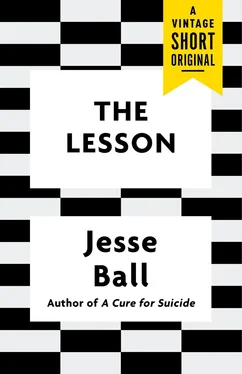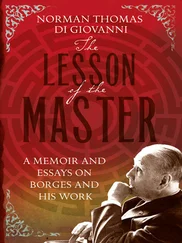— I don’t mean anything at all. I delivered that boy on the very morning that,
— I understand perfectly well, John. That must have been where you were when,
— When I was called to this house with a certificate, yes. I came from there.
— I see.
They looked at each other for a moment longer, and then, unsure what to say, or if anything at all should be said, the doctor gave a curt half-bow, and tramped off down the street. Loring leaned against the door and looked up at the second floor of the house opposite. A fine web of ivy had overtaken the entire face and hung in strands, like hair from the withers of an ox.
— Born at the very hour, she said.
A woman was passing selling bread. She had a dark green shawl wrapped over her shoulders, and her basket had a thick leather strap that held it to her back.
Loring bought a loaf of bread from the woman and took it indoors. It was still hot from the oven. The woman must just have come from baking. Yet she did not have the look of someone who had just baked something. Perhaps she was the sister of the baker. What should such a person look like?
— I have a question, the boy said.
— What is it?
— How did Ezra become so strong?
— It was a part of him, of his habits, his style. He had enough will to force himself to do what he wanted to do. He arranged his life in such a way that all his activities supported his great hope, of being the champion. Even I, even my chess playing became arranged so that I would play in the way that would best serve the development of his skill. He wasn’t very nice, and he wasn’t very likeable. Not many people liked him. But being liked wasn’t what he wanted. Later, of course, he was very beloved, but that’s different from being liked. The main thing was, he beat them all, every last one.
— Do you think I could do the same?
The cloth of the boy’s sweater had pilled. Loring pulled at it and set the fragment on the table.
— What do you mean?
— Well, perhaps if I learned about him, it would help me to be like him, to become a master.
— I can tell you many things about him, and show you, she said.
And she thought, If you are listening, please go and sit in the chair on the other side of the room.
A moment passed. Another. The glass of the windows looked suddenly very thin to Loring and she wondered how it could be that none of the panes had ever broken, not in all the years the house had stood.
The boy went and sat in the chair. He was holding something in his hand.
— What’s that? asked Loring.
— It’s an apple, he said.
She pried open his hand. It was the core of an apple.
— That’s not an apple, she said. It was an apple.
— It is an apple to me, said Stan.
— I am going to cut this bread, she said. Would you like some?
They went then into the kitchen, and something stops us from following.
Nonetheless, my love, I hold out my hand only to you as the train departs!
By what notion Loring had preserved that sense of herself which was her husband’s, we cannot say. Perhaps that was what was in the box, for certainly it was nothing she knew of. Yet, the sense remained, she was the same person, and in the same way, as though he were still beholding her and keeping her to the idea of her that he had always had.
They used to say to each other, when one would leave the house, the one staying would say:
Nonetheless, my love, I hold out my hand only to you as the train departs!
And the other would smile and go.
That There Should Be a Game of Sorts
did Loring decide. That the boy should be encouraged to play, but slowly, slowly — that also was decided. But none of it was in the nature of persuasion. Loring was not trying to persuade herself of anything, and certainly, she did not want to persuade the boy of something that wasn’t true. Rather, she was investigating, and the thing she saw was terrifying, entrancing.
— I do not believe there is any other world, she said.
— Another world? asked Stan.
They were speaking of metaphysical matters. Stan was continually asking questions about dreams.
— Yes, there are many who will tell you about it, but it must not be true.
— Why is that?
— Not because no one has come back from it, said Loring. But, because…
And here she paused.
— Because why?
Loring fussed with the edge of the tablecloth a moment.
— Because nothing is ever that way — the way people guess it will be. And so many want it to be that way, that there is another world. There mustn’t be. Do you see?
— Could we sit out on the lawn a bit?
She found a cloth from some hamper and tucked it under her arm.
They went together out the front door and around. To get to the back of the house they actually had to go down a lane that curved out and behind, past many other houses. There was no immediate access to the back. When they reached the next road, they turned and came along past a ridge of rock or an old stonewall, it was hard to say which it was. Then there was a long grassy rise, and there in its heart, the back of the house. Of course, they could have reached it just as well by climbing down through the trapdoor, but Loring was not much good at climbing down through trapdoors anymore, and besides, it was not the same thing — to take someone out to sit on the grass and to take someone through a trapdoor to go out and sit on the grass. Someone like Loring was skilled at nearly everything, and she did not get that way through imprecision. Therefore, they went the long way around.
— This is a book of photographs of him, taken by the artist Glisseau. He was very famous, and known for choosing his subjects very carefully. He has a book of photographs of Mussolini from his early days, and he photographed Pierre Solon on the day of his suicide.
She turned the pages for him, showing him photograph after photograph. In fact, she had not looked at the book in years, and it pained her to do so. She had forgotten a little what her husband had looked like to others.
— What are these things he’s wearing?
— Those are spats — to keep one’s boots clean. Although, really people wore them more for style than anything else.
In the photograph, Ezra was standing in front of some villa, holding a violin. Loring was looking out the window at him.
— He didn’t play the violin, she said. It was someone else’s. Oh, it was his.
She had turned the page and Ezra was standing with his arm around another man. Someone else was buried up to his neck, and the two were laughing at him.
— That’s Federico Marz. He was a terrible chess player, but a wonderful man. They used to play great practical jokes on the other masters. The one in the ground is Garing. I believe they gave him sleeping pills and buried him while he was asleep. When he woke, he was in the ground, and they had hired dancing girls to dance around and tease him. Somehow they didn’t make it into the picture. But he was a long-suffering fellow. He didn’t hold a grudge.
— Buried him to his neck — that’s awful, said Stan. Isn’t it, isn’t it awful?
— He was only like that for ten minutes, I think, said Loring defensively. See, here they are a week later — all friends.
Garing, Marz, Ezra, and Loring were in an high-backed carriage of some sort. It was a broad, open day and they were all four very young.
— Anna must have taken this. There are no photographs of her, though. She avoided it at all costs. She was Glisseau’s wife, but she loved someone else. It was never clear whom. Glisseau was more like her brother.
Читать дальше












